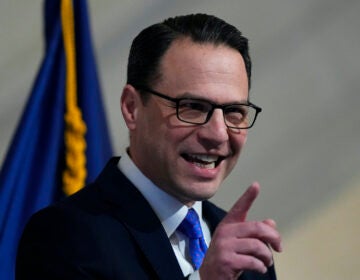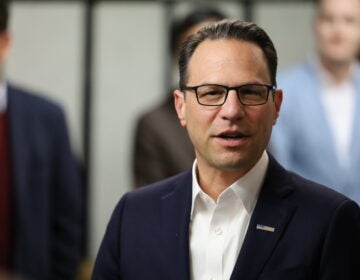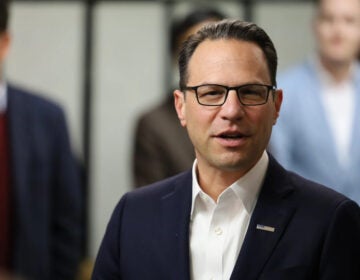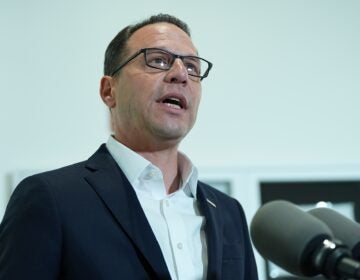Inside Pennsylvania Gov. Josh Shapiro’s support for private school vouchers
Shapiro, believed to be on Kamala Harris’ vice president shortlist, did not express public support for school vouchers until running for governor.
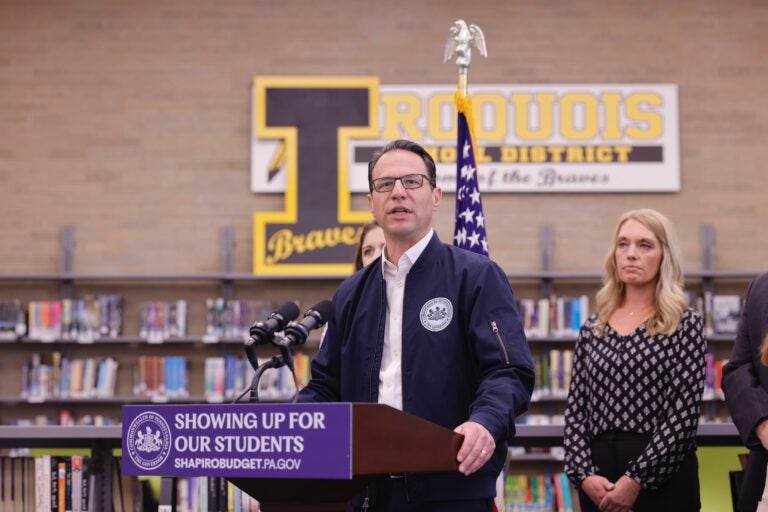
Gov. Josh Shapiro visits Erie County Junior and Senior High School. (Commonwealth Media Services)
This story originally appeared on Spotlight PA.
Pennsylvania Gov. Josh Shapiro is being eyed as a potential Democratic vice presidential nominee, but with that attention has come intense scrutiny of his support for a traditionally conservative idea: taxpayer-funded private school vouchers.
Since taking office last year, Shapiro has become the most prominent Democratic voice in the state for such a program. Last summer, he backed a controversial Republican voucher proposal to the chagrin of longtime party allies and influential unions that supported his candidacy — though he ultimately vetoed the language after facing opposition from fellow Democrats.
Despite his high-profile public backing, Shapiro’s embrace of vouchers appears to be a relatively new conviction, according to political insiders and others who have worked with and followed the governor in his two-decade political career. As a state lawmaker in the 2000s, he didn’t advocate for the issue, they recalled, let alone push legislation.
Shapiro’s thinking on the issue can be understood in part through his relationship with at least one prominent school choice advocate, sources told Spotlight PA.
Voucher programs vary widely, but they broadly route public money to pay for tuition at private and religious schools.
Proponents argue they give children attending struggling public schools crucial options, while opponents say they weaken public schools by diverting funding and don’t necessarily help students. Studies have shown that their effects are mixed, with more recent reviews of statewide programs showing they have caused student test scores to decline.
Shapiro did not publicly back creating a voucher program until his run for governor in 2022, according to a review of news articles and public statements he has made.
He has tempered his position — deeply unpopular among many of his Democratic colleagues — by saying he will only support such a program if it does not take money away from public education.
“I think it’s very important that we fully fund public education,” Shapiro told reporters at a 2022 campaign event. “And I also think it’s really important that we empower parents to put their kids in the best place for them to be able to succeed.”
To be sure, during his time as governor, both state budgets have included major public education investments. This year’s $1.1 billion increase for K-12 education was the largest single-year bump in the state’s history, according to Shapiro.
“In his time in office, Governor Shapiro has consistently delivered historic increases in public education funding and finally, after decades of inaction, moved Pennsylvania towards adequately and equitably funding our public schools,” Shapiro spokesperson Manuel Bonder said in a statement to Spotlight PA.
Behind the scenes, however, he has also tried to convince fellow Democrats to set aside public dollars for vouchers. For many of them, Shapiro’s insistence on the issue is confounding.
Shapiro, 51, has been an elected official since 2005, when he joined the state House representing the Montgomery County district where he grew up and still lives. Several former colleagues say that during his eight years in the chamber, he wasn’t involved in school choice debates in any significant way.
“I’ve had conversations with [Shapiro] about many other things,” said Tony Payton, a former Democratic state representative from Philadelphia who supports school vouchers and served alongside the governor, “and that wasn’t one of them.”
There would have been opportunities.
In 2011, while Shapiro was still a state House member, then-Gov. Tom Corbett, a Republican, launched a push to create a school voucher program. That effort passed the state Senate with bipartisan backing but foundered in the state House, where it never came up for a vote.
State Sen. Anthony Williams (D., Philadelphia) was one of the Democrats who supported it. He told Spotlight PA that Shapiro wasn’t involved in pushing for the program.
“Any Democrat that was for school choice, I would know that,” he said.
Williams, who is still a member of the chamber and remains one of the Democratic Party’s strongest school choice supporters in the state, says he didn’t get a hint that Shapiro was open to vouchers until he was running for governor.
“Now, I don’t know the whole motivation,” Williams said. He added that when he spoke to Shapiro about passing school choice legislation more recently, the governor said it was the “right thing to do.”
Williams added that Shapiro “has friends who are in the school choice community who align with him about that issue. And so in the conversations, I’m told, this issue came up, and they sort of found common ground.”
Those friends, Williams said, “were supporters, who are strong choice people, who supported his campaign, because they were supportive of the issue of choice.”
Three sources who spoke on condition of anonymity to discuss a sensitive political issue told Spotlight PA that notable among them is Joel Greenberg, a billionaire co-founder of the global high-speed trading firm Susquehanna International Group.
Greenberg served on Shapiro’s gubernatorial transition team with an assignment to focus on education policy, and multiple sources confirmed to Spotlight PA that the two have known each other for more than a decade.
In 2015, Shapiro, then a Montgomery County commissioner, gave the Philadelphia Inquirer his assessment of Greenberg’s political and philanthropic work.
“He’s a major employer in the region and he’s wonderfully philanthropic — for Jewish causes, educational causes and other community organizations,” Shapiro told the paper.
Another co-founder of Susquehanna International Group is even more well-known in the world of Pennsylvania school choice advocacy: billionaire Wall Street trader Jeffrey Yass. He’s emerged as a major Republican donor nationally and an inescapable power broker within the commonwealth, despite his nearly nonexistent public profile.
Both Greenberg and Yass have been involved in bankrolling the school choice movement for more than a decade in Pennsylvania.
“We are not in this to run charter schools, to manage charter schools. This is purely altruistic,” Greenberg told WHYY in 2015, when asked about his support for Williams’ mayoral campaign. “We view this as helping kids have a choice who are trapped in failing, oftentimes violent schools.”
Along with fellow suburban Philadelphia billionaire and SIG co-founder Arthur Dantchik, Greenberg and Yass were at one point the main donors to Students First, a political action committee founded in 2010 to support school choice candidates.
Shapiro accepted $175,000 from that PAC between 2012 and 2016, according to campaign finance records. During that time, he was a Montgomery County commissioner and, by 2016, was running for attorney general.
The donations to Shapiro’s attorney general campaign so troubled Philadelphia’s teachers union that it quietly pulled its endorsement at the last minute, multiple news outlets reported.
The union declined to comment at the time, but a source with knowledge of the situation confirmed to Spotlight PA that the union pulled its endorsement over the Students First donations. (The Pennsylvania State Education Association, a larger, statewide teachers union, continued to back Shapiro in that election.)
During the 2022 gubernatorial race, PACs connected to Yass spent millions during the primary to oppose eventual Republican nominee state Sen. Doug Mastriano (R., Franklin). One of those PACs, Commonwealth Leaders Fund, ran anti-Shapiro ads during the general election but scaled back then stopped that spending shortly after Shapiro publicly pledged his support for vouchers.
Once elected, Shapiro sought to create such a program as part of the 2023-24 state budget.
“I believe every child of God deserves a shot here in the Commonwealth of Pennsylvania, and one of the best ways we can guarantee their success is making sure every child has a quality education,” Shapiro told Fox News in June 2023, late in the state’s budget process.
The remarks preceded the Republican-controlled state Senate’s sudden passage of a budget deal that included $100 million in taxpayer money to fund private school tuition for students in low-performing public districts.
But once the budget reached the state House, Shapiro received hard pushback from the lower chamber’s new Democratic majority. In a politically embarrassing setback, Shapiro agreed to veto the voucher dollars in exchange for the rest of the plan’s passage. That veto led to a nearly six-month budget impasse as state Senate Republicans claimed betrayal.
In his February budget address this year, Shapiro called on the legislature to again consider vouchers, though a top Republican leader later accused him of being unwilling to use his “bully pulpit” to get such a program across the finish line.
His ongoing support also hasn’t saved him from Yass-funded criticism.
For the past two years, a 501(c)(4) nonprofit, which does not have to disclose its donors, has spent prodigiously on ads and other lobbying to criticize politicians who don’t support vouchers.
The group, Commonwealth Action, has received significant dollars from the free market Commonwealth Partners Chamber of Entrepreneurs, according to that group’s most recent filings to the IRS. Commonwealth Partners runs two political action committees that are among the most active in Pennsylvania school choice advocacy, and both are almost entirely funded by Yass.
Between April 2023 and March 2024 — the last recorded filing — Commonwealth Action reported spending more than $973,000 on indirect education lobbying, which includes advertising and other methods aimed at shifting public opinion.
One video from last summer funded by Commonwealth Action accused Shapiro of “choosing special interests over kids.”
Commonwealth Action is linked to an established conservative organization in Pennsylvania, the Commonwealth Foundation. Since summer 2023, the exterior of the organization’s Harrisburg building, which is across the street from the state Capitol, has featured ads calling for Shapiro to pass the voucher plan. The foundation is now funding a six-figure newspaper and TV ad campaign.
“You lied, and you turned your back on us again,” Printess Garrett, a Harrisburg mother, says in a TV spot. “The only thing we have for our children is our word, and if we can’t trust in your word, we don’t have anything else.”
Moving forward, political sources told Spotlight PA they expect teachers unions and other public education advocates to be among the most skeptical of a Shapiro vice presidency.
On Wednesday, 28 education advocacy groups from across the country sent an open letter to presumptive Democratic presidential nominee Kamala Harris arguing that “it is essential that our President and Vice President be wholly committed to our nation’s public education system and willing to fight against school privatization in all its forms.”
But to Payton, not considering Shapiro for backing a policy to aid parents in the hunt for what’s best for their kids is a bad choice.
“To blatantly disqualify somebody over something ideological like that is foolish,” Payton said.
 Spotlight PA is an independent, nonpartisan, and nonprofit newsroom producing investigative and public-service journalism that holds the powerful to account and drives positive change in Pennsylvania.
Spotlight PA is an independent, nonpartisan, and nonprofit newsroom producing investigative and public-service journalism that holds the powerful to account and drives positive change in Pennsylvania. 
Get daily updates from WHYY News!
WHYY is your source for fact-based, in-depth journalism and information. As a nonprofit organization, we rely on financial support from readers like you. Please give today.


